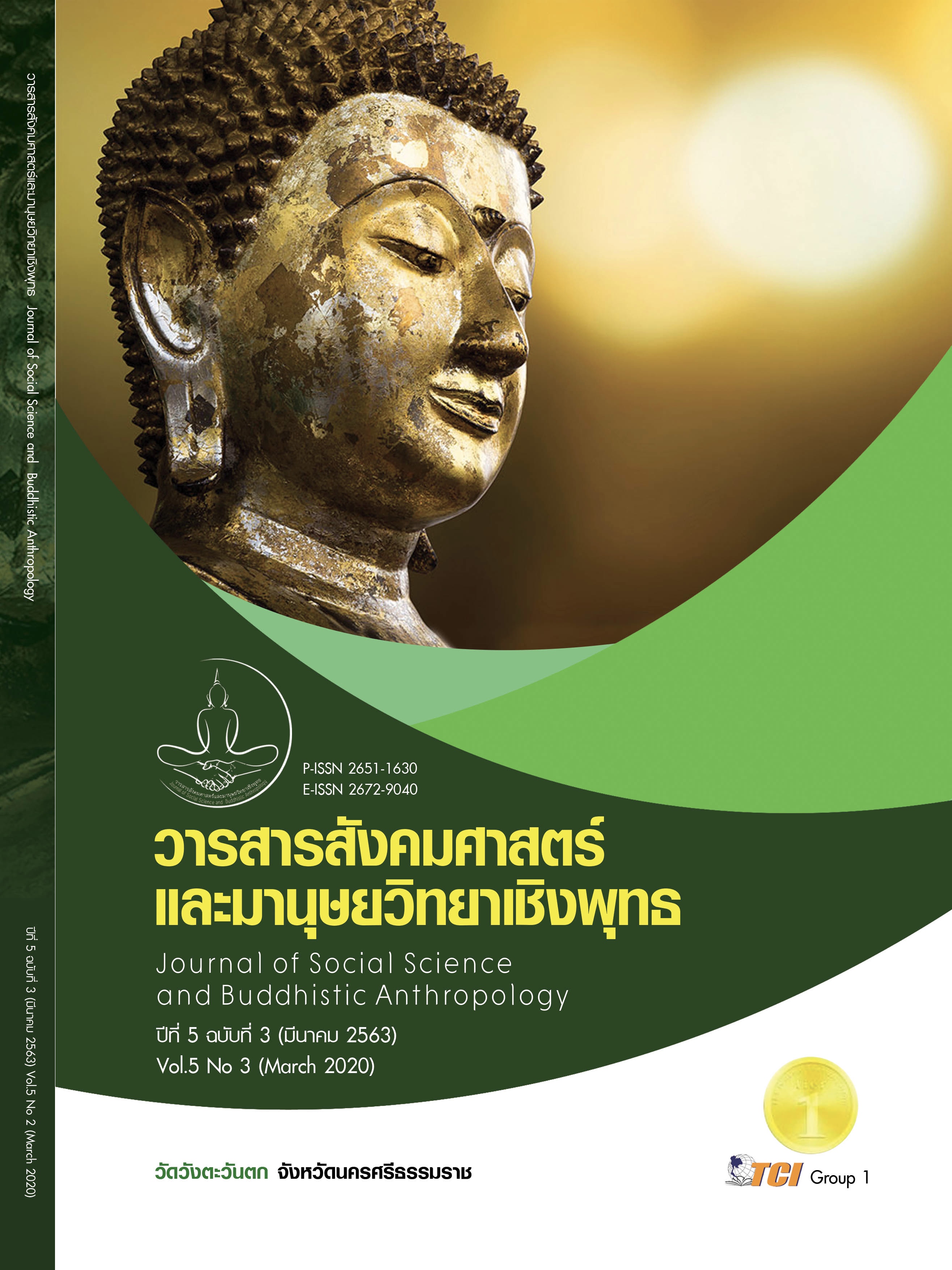THE POST - MODERN PHILOSOPHY APPLY FOR EDUCATION MANAGEMENT OF BUDDHIST MONK WHO TEACHING MORALITY AT SCHOOL IN THE 26TH CENTURY BUDDHIST
Keywords:
Application, Postmodern Education Philosophy, Educational Management, Buddhist Monks’s Teaching Morality, 26th Century BuddhistAbstract
The objectives of this dissertation were: 1) to study the concepts and theories concerning the educational management of Buddhist monks. 2) to study the postmodern education philosophy of appropriate to the Buddhist monks. 3) To apply the postmodern education philosophy to find out guideline for solving the problems in the educational management of Buddhist monks. and 4) To create new knowledge and development of educational management of Buddhist monks to be effective. This research was a qualitative research by dialectical philosophical research method and reasoning by using in-depth interview to specify with important data which is a representative of a person who is involved in a moral school. It can divide into 5 groups such as 1) school administrators 2) student 3) parents or related persons or general person 4) educational academic and 5) monk moral teacher. by using content analysis summarized as an overview. The research found that: 1) the concepts and theories are the education management, educational management composition, education management in the 26th Century Buddhist, teaching method and the history of monk’s moral teaching at school. 2) the postmodern education philosophy such as 1) philosophy of Buddhist education 2) philosophy of reform education 3) progressivism and 4) Perennialism. 3) Philosophy of postmodern education applied as a solution to educational management problems which included with staff, teaching process, media and in the aspect of evaluation and monitoring. by Buddhist philosophy of education was designed as a learning activity for children and youth with knowledge and morality. A better quality of life and happiness. 4) the new knowledge means management of the Knowledge and Morality by precepts, meditation intelligence to instill morals and ethics (access) and to (understand) the quality of life improved (developed) teaching to the learner-centered learning, how to analyzing Ariyasacca 4 (4 noble truths) and considering to Yonisomanasikara, choosing knowingly to receive new information and culture that supported by teaching to be a good friend for helping them to solve the problem (Poratokhosa).
References
คณะกรรมาธิการสภาปฏิรูปการศึกษาและพัฒนาทรัพยากรมนุษย์ สภาปฏิรูปแห่งชาติ. (2558). รายงานยุทธศาสตร์การปฏิรูปการศึกษาและพัฒนามนุษย์. กรุงเทพมหานคร: หนังสือพิมพ์คมชัดลึก .
นวพร ดำแสงสวัสดิ์ และคณะ. (2562). ปรัชญาประสบการณ์นิยมและการพัฒนาสู่การจัดการศึกษาพยาบาลในพุทธศตวรรษที่ 26. วารสารเครือข่ายวิทยาลัยพยาบาลและการสาธารณสุขภาคใต้, 6(3), 74-96 .
บุญชม ศรีสะอาด. (2554). วิธีการทางสถิติสำหรับการวิจัย เล่ม 2. พิมพ์ครั้งที่ 2. กรุงเทพมหานคร: สุวีริยาการพิมพ์.
พรศรี อุ่นต้ม. (2558). การคิดแก้ปัญหาโดยใช้กิจกรรมแบบอริยสัจ 4 สาระเศรษฐศาสตร์สำหรับนักเรียนชั้นประถมศึกษาปีที่ 6 โรงเรียนวัดกู่คำ อำเภอสันป่าตอง จังหวัดเชียงใหม่. ใน วิทยานิพนธ์ครุศาสตรมหาบัณฑิต สาขาวิชาหลักสูตรและการสอน . มหาวิทยาลัยราชภัฏเชียงใหม่.
พระครู พินิตกิจจาทร (ยอดน้ำคำ). (19 มิถุนายน 2562). การประยุกต์ใช้ปรัชญาการศึกษาหลังนวยุคในการจัดการศึกษาของพระสอนศีลธรรมในโรงเรียนในพุทธศตวรรษที่ 26. (พระสาโรจน์ ธมฺมสโร (แซ่อู้), ผู้สัมภาษณ์)
พระมหาวิจัก กิตฺติวณฺโณ (ชนะพจน์). (2561). รูปแบบการพัฒนาทักษะการสอนของพระสอนศีลธรรมตามหลักพุทธวิธีการสอนในสถานศึกษา สังกัดสำนักงานเขตพื้นที่การศึกษาประถมศึกษา. วารสารมหาจุฬานาครทรรศน์, 6(4), 86-109.
พระสิริพงศ์ พุ่มชยาภรณ์. (19 มิถุนายน 2560). การประยุกต์ใช้ปรัชญาการศึกษาหลังนวยุคในการจัดการศึกษาของพระสอนศีลธรรมในโรงเรียนในพุทธศตวรรษที่ 26. (พระสาโรจน์ ธมฺมสโร (แซ่อู้), ผู้สัมภาษณ์)
พุทธทาสภิกขุ. (2549). คู่มือมนุษย์. กรุงเทพมหานคร: สำนักพิมพ์ วิชั่นบุ๊ค.
ยืน ภู่วรรณ และสมชาย นำประเสริฐชัย. (2546). ไอซีทีเพื่อการศึกษา. (พิมพ์ครั้งที่ 2). กรุงเทพมหานคร: ซีเอ็ดยูเคชั่น.
วิจารณ์ พานิช. (2555). วิถีสร้างการเรียนรู้เพื่อศิษย์ในศตวรรษที่ 21. กรุงเทพมหานคร: มูลนิธิสดศรี - สฤษดิ์วงศ์.
สำนักงานคณะกรรมการพัฒนาการเศรษฐกิจและสังคมแห่งชาติ (สศช.). (2559). แผนพัฒนา เศรษฐกิจและสังคมแห่งชาติ ฉบับที่ 12 พ.ศ. 2560 - 2564. เรียกใช้เมื่อ 24 มกราคม 2562 จาก http: www.nesdb.go.th/Default.axpx? tabid395
สำนักงานพระสอนศีลธรรม มหาวิทยาลัยมหาจุฬาลงกรณราชวิทยาลัย. (2551). คู่มือปฏิบัติงานโครงการพระสอนศีลธรรมในโรงเรียน. เชียงใหม่: มหาวิทยาลัยมหาจุฬาลงกรณราชวิทยาลัย.
เอนก สุวรรณบัณฑิต. (2560). ปรัชญาสวนสุนันทา. เรียกใช้เมื่อ 6 มกราคม 2562 จาก https://philosophy-suansunandha.com
Cronbach, L. J. (1990). Essentials of psychological testing (5th ed.). New York: Harper Collins. Publishers.
Kenaphoom, S. (2015). The Writing Format of Research Conceptual Frameworks on Management. Journal (Humanities and Social Sciences), 8(3), 33-42.









